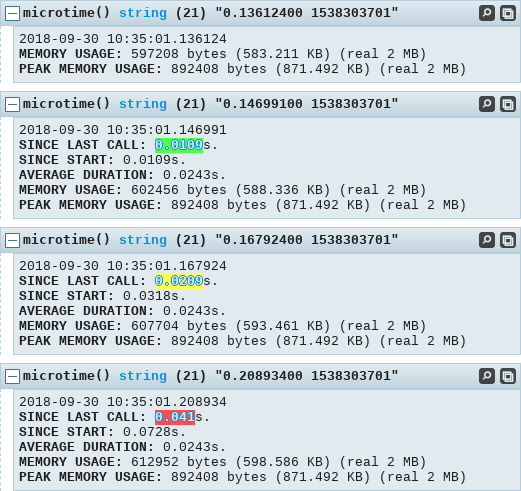Advanced usage
Render modes
Kint has 4 render modes available by default:
Rich
This is the one you saw on the previous page. It outputs the most data possible in an easy to read way.
Use this output mode with the d() helper function.
Text
The text mode is similar to var_dump - it outputs raw text with no formatting for the web. It also doesn’t display much extra parsed data and only the raw values of the things you give it.
Use this output mode with the ~ modifier: ~d().
Plain
This is basically the text mode but with html escaping and color highlighting. It still only shows basic information but it does it in a way that’s easy to read in a browser.
Use this output mode with the s() helper function.
CLI
This is basically the text mode but with bash color highlighting and automated terminal width detection. This will be automatically chosen if you run your script from a terminal.
Plugins
Plugins will transform input data to make it more useful to you. For example, the JsonPlugin will let you expand json strings without having to decode it yourself.
To add a plugin add the classname to the Kint::$plugins array if it implements ConstructablePluginInterface, or the instance if it implements PluginInterface.
All parser plugins delivered with Kint are in the Kint\Parser namespace.
Default plugins
These plugins are on in a default Kint installation.
ArrayLimitPlugin
Limits output of long arrays.ArrayObjectPlugin
EnsuresArrayObjectis parsed with the correct mode, and set back afterwards.Base64Plugin
Decodes base64 encoded strings.BinaryPlugin
Displays strings without detected encoding likexxd

BlacklistPlugin
Lets you hide information you don’t want dumped, and improve performance by skipping heavy values.ClassHooksPlugin
Shows hook methods for an objects properties.ClassMethodsPlugin
Shows methods available for an object.ClassStaticsPlugin
Shows statics and constants for an object.ClassStringsPlugin
Shows methods, statics, and constants for a class when the top level dump is a class name string.ClosurePlugin
Shows properties and uses for aClosure.ColorPlugin
Detects a color string, then shows a color swatch and different ways to write the color.DateTimePlugin
Shows the formatted datetime inline, before unfolding.DomPlugin
Add support forDomandDOMDocumentobject parsing.EnumPlugin
Add support for enums.FsPathPlugin
Detects server file paths and shows information about them. See alsoSplFileInfoPlugin.HtmlPlugin
Detects an HTML string and loads it intoDOM\HTMLDocument.IteratorPlugin
Shows the contents of anIterator.JsonPlugin
Decodes JSON encoded strings.MicrotimePlugin
Automatically shows memory and timing information when you dumpmicrotime(). CallMicrotimePlugin::clean()to reset the counters.

MysqliPlugin
Adds support forMysqliobject parsing.SimpleXMLElementPlugin
Adds support forSimpleXMLElementsobject parsing.SplFileInfoPlugin
Shows information about the file.StreamPlugin
Shows stream metadata for stream resources.TablePlugin
Shows table-like multidimensional arrays as a table.ThrowablePlugin
Shows the exception or error message inline, with the place in the source where it was thrown.TimestampPlugin
Detects integers that seem like timestamps (Between 9 and 10 digits) and formats the time.ToStringPlugin
Shows the string representation of an object with a__toString()method.TracePlugin
Detects a backtrace, and gathers information like stack frame source code snippets.XmlPlugin
Detects an XML string and loads it intoSimpleXML,DOMDocument, orDOM\XMLDocument.
Opt-in plugins
SerializePlugin
Decodes serialized strings. Serialization has been a security pain forever, so it’s disabled by default.ProfilePlugin
Profiles your dump to identify classes, interfaces, instances, or properties causing performance issues.-
ProxyPlugin
This takes the array of types and bitmask of triggers the plugin should apply to, as well as a callback that should be run. The second argument is either aContextInterfaceor anAbstractValuedepending on the trigger.This is mostly useful if you don’t want to make your own plugin class. Here’s an example of using
ProxyPluginto make a simpleToStringplugin:<?php use Kint\Value\AbstractValue; use Kint\Value\Representation\StringRepresentation; use Kint\Parser\Parser; use Kint\Parser\ProxyPlugin; use Throwable; $plugin = new ProxyPlugin( ['object'], Parser::TRIGGER_SUCCESS, function (&$var, AbstractValue $v, int $trigger, Parser $parser): AbstractValue { $reflection = new ReflectionClass($var); if (!$reflection->hasMethod('__toString')) { return $v; } try { $string = (string) $var; } catch (Throwable $t) { return $v; } $r = new StringRepresentation('toString', $string); $v->addRepresentation($r); return $v; } ); $parser->addPlugin($plugin);
Custom plugins
You can write your own plugins for Kint too. Check out the the plugin guide.
Helper functions
Sometimes you want to change Kint behavior without using a plugin, or just add a new function name for Kint. You can do that by making a new helper function.
A set of useful kint helpers is provided in our kint-helpers repository. You can install it with composer or just include the init.php file after Kint has loaded.
composer require kint-php/kint-helpers
You can also write your own helper functions for simple changes in functionality. For example, if you wanted to call Kint from dump() you could do this:
<?php
// Some Kint features (Variable names, modifiers, mini trace) only work if Kint
// knows where it was called from. But Kint can't know that if it doesn't know
// what the helper function is called. Add your functions to `Kint::$aliases`.
Kint::$aliases[] = 'dump';
function dump(...$vars)
{
return Kint::dump(...$vars);
}
Disabling helper functions in composer
Kint won’t define the d() and s() helper functions if they already exist, but when using composer you may sometimes want to disable them ahead of time.
By adding an extra.kint.disable-helpers key to your composer.json, Kint will skip defining the helper functions. You can use this in your root composer.json, or any package installed alongside Kint, and it should work.
{
"require-dev": {
"kint-php/kint": "^6"
},
"extra": {
"kint": {
"disable-helpers": true
}
}
}
You can also define KINT_SKIP_HELPERS as true for the same effect, which is helpful if you’re using the phar file, but this needs to be set before the autoloader begins.
<?php
define('KINT_SKIP_HELPERS', true);
include 'vendor/autoload.php';
 Kint
Kint